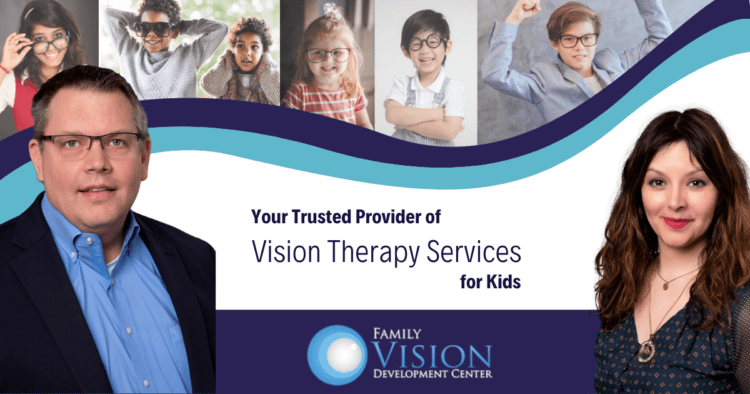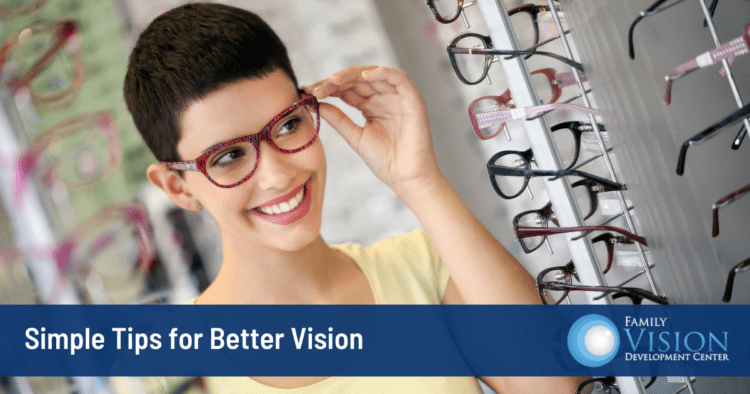Most parents understand the importance of protecting their child’s vision. After all, success in school, in sports and in life in general are all tied to healthy vision. So when a parent notices that their child is experiencing issues with their vision, they want to know the best options available to treat the problem. Glasses or contacts are possible solutions for some disorders, but not all. Vision therapy is an extremely effective form of treatment for a wide range of vision conditions, and kids can truly benefit from the process. Here is some important information to get you started, so you can discover if vision therapy might be the right choice for your child.
What is Vision Therapy?
Vision therapy is a kind of physical therapy for the visual system, which includes the eyes and the brain. This therapy uses specialized eye exercises to help patients develop or recover normal visual skills. Completing this vision training can help kids (or adults) improve their vision so they are better able to perform daily tasks like reading, writing, driving, athletic participation and much more.
What is Involved in a Vision Therapy Program?
Creating a custom-tailored program for your child starts with a comprehensive vision exam. Once a vision disorder has been appropriately diagnosed, a vision therapy plan is developed to meet the specific needs of your child. A majority of the therapy is completed right in our office, with some at-home exercises designed to support our in-person sessions. Appointments are simple and comfortable for kids, usually lasting 30-45 minutes and involving short activities or games to complete the eye exercises.
What Disorders can Vision Therapy Help Treat?
We have seen remarkable success when using vision therapy as a treatment in the following situations:
- Binocular vision impairments – which occur when the eyes do not work together as a team. This can result in disorders such as amblyopia (lazy eye), strabismus (crossed eyes), esotropia (eye turns inward), exotropia (eye turns outward) or hyperphoria (eye turns upward)
- Focusing issues – keeping objects in focus when looking from one object to another
- Eye tracking issues – inability to smoothly follow an object from one place to another
- Visual processing problems – when the brain does not correctly interpret visual information
- Visual impairments sustained due to post-concussive vision syndrome or a traumatic brain injury
- Visual issues caused by certain genetic conditions present in some special needs individuals
- Computer vision syndrome – caused by excessive digital screen exposure
Vision Therapy is our Specialty
At Family Vision Development Center our specialty is providing custom, personalized vision therapy programs to meet the needs of our patients. Our highly-qualified doctors have completed advanced training so you can feel confident that your child is receiving the best possible care. Dr. Martin is an optometrist & vision rehabilitation specialist with special training in vision therapy and vision development, who is also pursuing a fellowship from the Neuro-Optometric Vision Rehabilitation Association. Dr. Santoyo-Johnson is also an optometrist and vision rehabilitation specialist, and is the only provider in the area who is a Board Certified Fellow in light therapy by the College of Syntonic Optometry.
We look forward to working with your family and providing the best treatment options for your child in order to restore their vision to the fullest extent possible. Contact our office at 630-862-2020 to learn more and to schedule your appointment.
Additional information can be referenced here
It’s that time again! The start of a new year means thinking about all the great ways you can improve your life, in order to be happier and healthier. Interestingly, you might find that some of the common goals such as eating better or quitting smoking can also help you achieve another important goal – improved vision! Here are a few easy ways you can work to protect your eyesight.
Diet Tips
Changes in diet are often at the top of new year’s resolutions lists. But besides the obvious health benefits of eating better, a better diet can also have lasting improvements to your vision. Making these easy changes to the food you eat can add important vision-friendly nutrients into your diet.
- Increase your omega-3 fatty acids with fish, nuts or seeds
- Get more vitamin C with citrus fruits and leafy green vegetables
- Eat foods rich in vitamin E like nuts and legumes, seeds, sweet potatoes and eggs
- Vitamin A is also important for vision and can be found in foods like carrots and sweet potatoes (which are also rich in beta carotene)
- Increase your zinc intake with beef, chicken, pork or eggs to help delay macular degeneration
Lifestyle Tips
Along with adding the right foods into your diet, there are changes you can make to your everyday lifestyle that can help protect your vision.
- Stop smoking – most people are fully aware of the dangers of smoking. However, many do not realize that smoking can increase the risk of age-related macular degeneration, glaucoma, cataracts, diabetic retinopathy and dry eye syndrome.
- Wear protective lenses – always remember to wear sunglasses that block 100% of UV rays while outside, quality safety glasses while boating or riding a motorcycle, as well as any protective goggles that are issued at your workplace. Lasting damage can be quickly sustained by the sun’s harmful rays or flying debris if your eyes are not properly guarded.
- Wash your hands frequently – hopefully during this time of COVID-19, handwashing has become a standard routine. But in case you need another reason, thoroughly washing your hands before touching your eyes can help prevent dangerous bacterial and viral infections that can cause long-term vision damage.
- Take better care of your contact lenses – make sure you follow proper procedures for care and maintenance of contacts to ensure the safety of your eyes. For example, always wash your hands before touching them, only use fresh, clean solution, store them in a sterilized case and be careful of extended use.
Healthcare Tips
Taking care of your health is very important for many reasons, including maintaining the quality of your vision. Because your overall health can be a big factor in your eye health, be sure to keep current on health maintenance issues such as the following.
- Visit your primary doctor regularly – annual exams with your doctor allow you to monitor important factors like blood pressure, cholesterol and blood sugar. Abnormalities in any of these can also lead to serious vision issues like diabetic retinopathy, glaucoma, blurry vision, or vision loss.
- Get regular vision exams – it is just as important to see your eye doctor for regular eye exams, as many vision conditions are only detectable through a comprehensive evaluation. Early detection can often give you a far better opportunity to fully correct an issue. Regular exams allow your eye doctor to detect any changes in vision right away, and begin treatment faster.
- Share your complete family medical history – when you visit your primary care doctor, as well as you eye doctor, it is important to give a detailed history of any medical issues in your family. Many eye conditions are hereditary so sharing your complete history allows your doctor to monitor for those conditions more closely, and advise the best possible care when appropriate.
At Family Vision Development Center, we look forward to helping you ring in the new year with a renewed commitment to protecting your vision. Our highly qualified team provides eye care for the whole family, including eye exams, glasses and contacts, and advanced vision therapy programs. Call our Aurora location at 630-862-2020 to schedule your appointment or get additional information.
Additional information can be referenced here



